活動報告
山本幸三活動報告誌「去私利他」のご案内(英語版 + 中国語版) 更新5/1
このたび、私共山本幸三の活動報告誌、「去私利他」を作成いたしました。
昨年8月の大臣就任より半年間の活動をまとめたものになります。
また、今回は英語版とともに中国語版も作成しております。
併せてぜひ、ご覧ください。
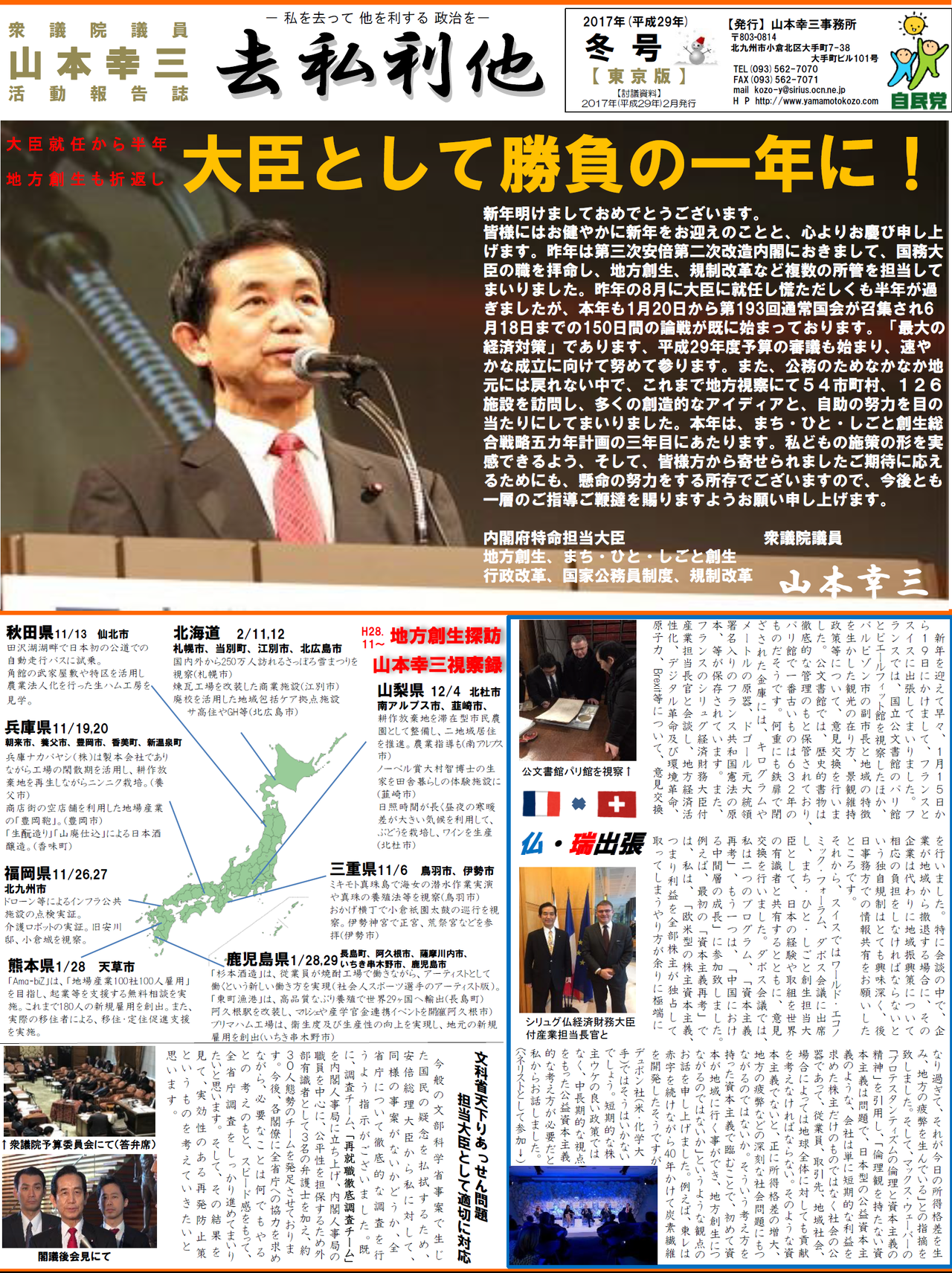
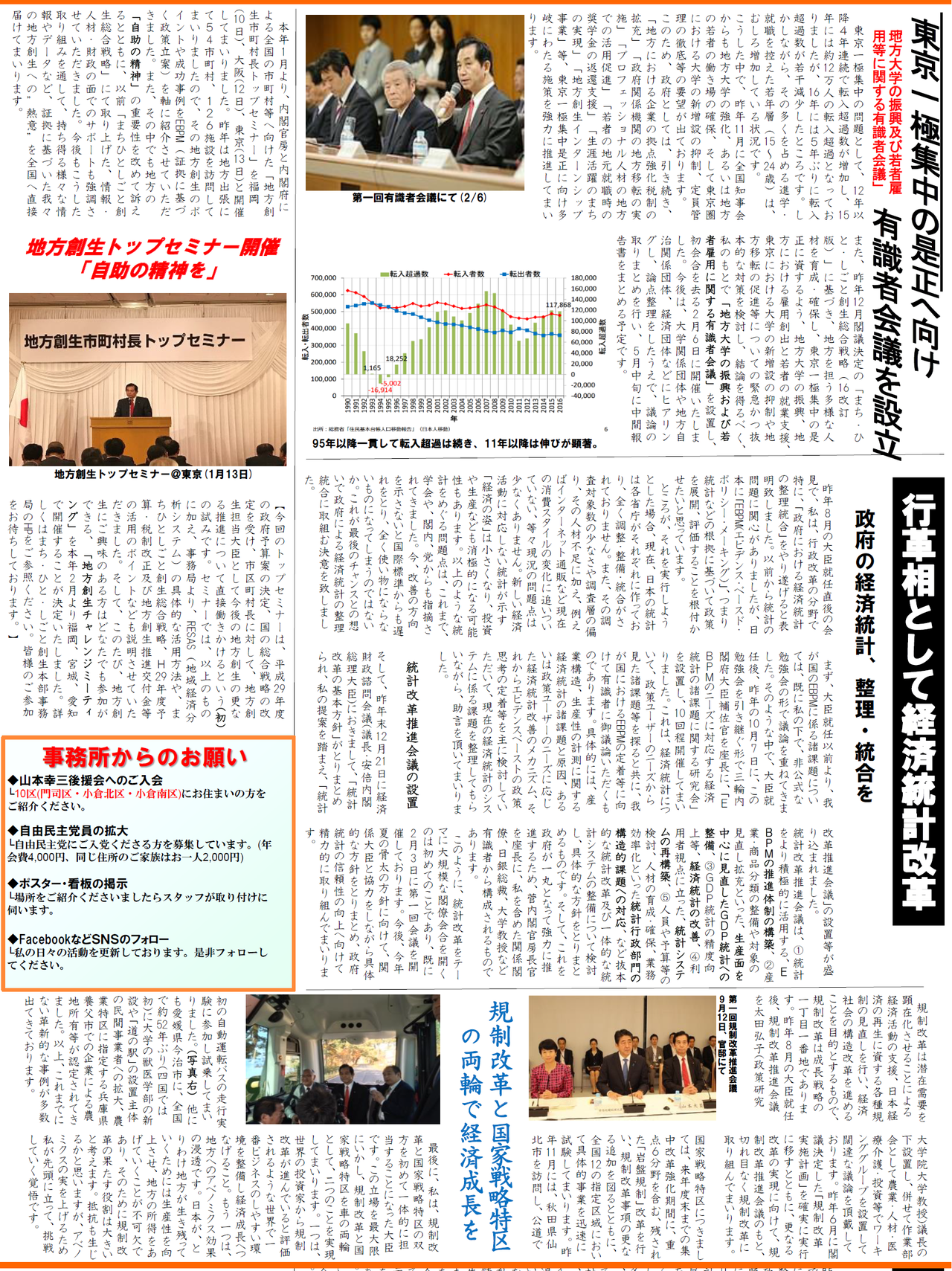
(English version)
Kozo Yamamoto Progress Update, 2017 Winter Edition
– Tackling the New Year as Minister –
I would like to use this occasion to express my genuine appreciation and gratitude, and to wish a healthy and prosperous New Year to everyone who has supported me over the years. As a state minister in the Second Reshuffled Third Abe Cabinet, is has been my privilege to be entrusted with so many duties including regional revitalization and regulatory reform. The past six months since assuming the ministerial office has been a blur, yet also a truly exciting time.
With the convening of the 193rd Ordinary Diet Session on January 20th, the 150 day battle until June 18thhas already begun. As we make progress in deliberations for the FY2017 National Budget, which sways all of our future economic policies, I can only hope that you forgive my lack of presence in Fukuoka while I fulfill my Cabinet Office responsibilities. Through my visits to 126 different institutions in 54 cities, towns, and villages thus far, I have personally witnessed numerous innovative ideas and genuine efforts of self-help that Japanese people from around the country are undertaking in the name of regional revitalization.
This year marks the third in our five year plan for the Act on Overcoming Population Decline and Vitalizing Local Economy in Japan. As we continue to make our policy dreams into realities, and I devote myself entirely to my duties, I humbly ask for your continued support and best wishes.
Yours truly,
Kozo Yamamoto
Member of the Lower House
Minister of State
Research Trip to France and Switzerland
Shortly after New Year’s Day, I hopped on a plane for a research trip to France and Switzerland that would last from January 5th to the 19th. After a spectacular visit to the National Library and the Pierrefitte-sur-Seine in Paris, the vice mayor of Barbizon and I had a fruitful discussion on methods of vitalizing rural areas that take advantage of local uniqueness and tourism attractions while also employing preservation strategies. Following that was a look through the public archives, which hosts – with the utmost care and security – among other things, artifacts dating back to 632AD, the original Constitution of France with the signature of Charles de Gaulle, and the Mètre des Archives, tucked away behind heavy steel doors.
I then had the pleasure of a candid discussion with the French Secretary of State for Industry, Christophe Sirugue, on the topics of stimulating regional economies, the environmental and digital revolutions, nuclear energy, and Brexit.
Among these issues, one that especially piqued my curiosity was the notion of an independent regulation that mandates an appropriate amount of financial responsibility for a business to give back to the community when moving out of a locality. We touched bases after my return to exchange more information and further the discourse.
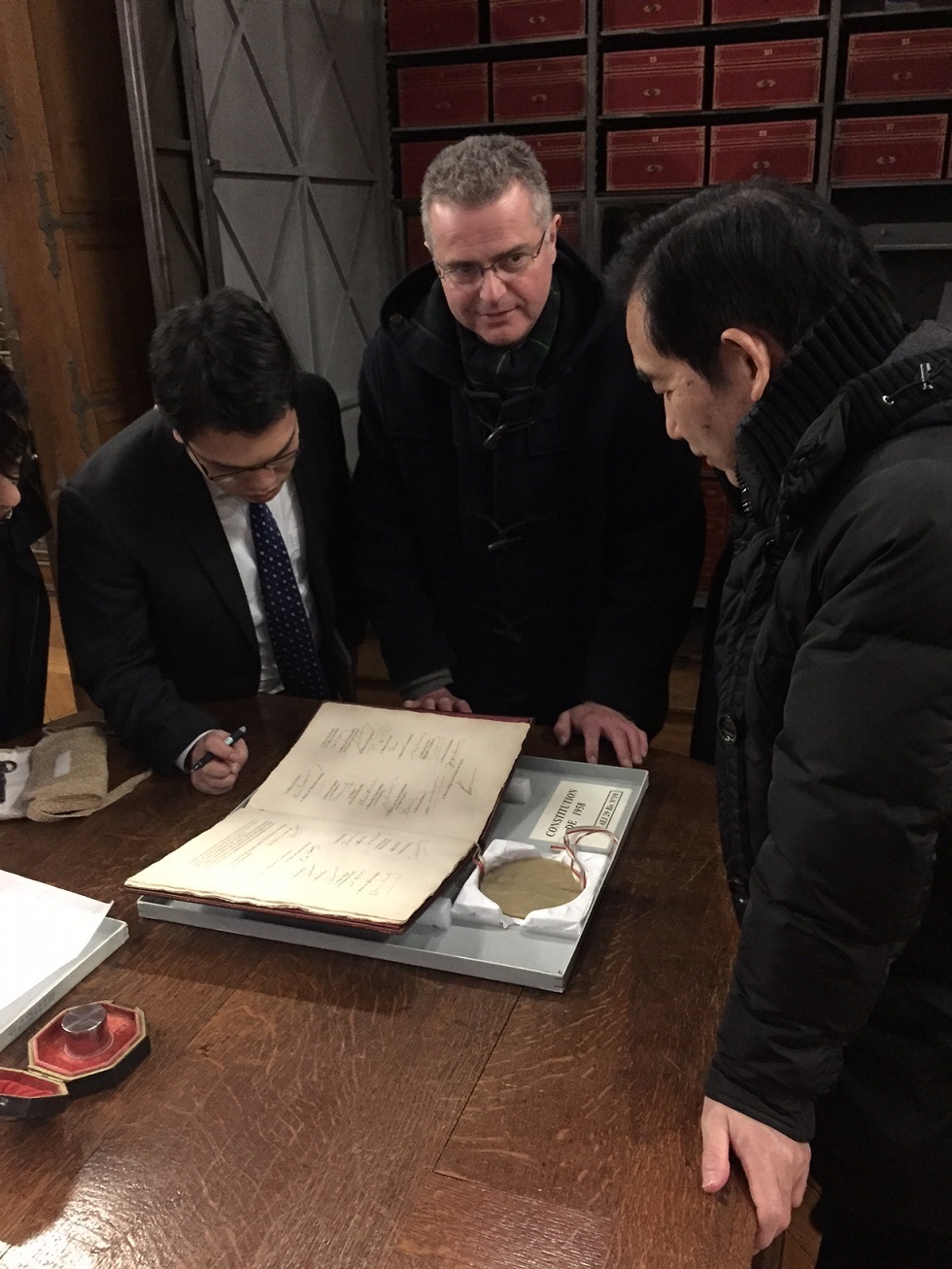
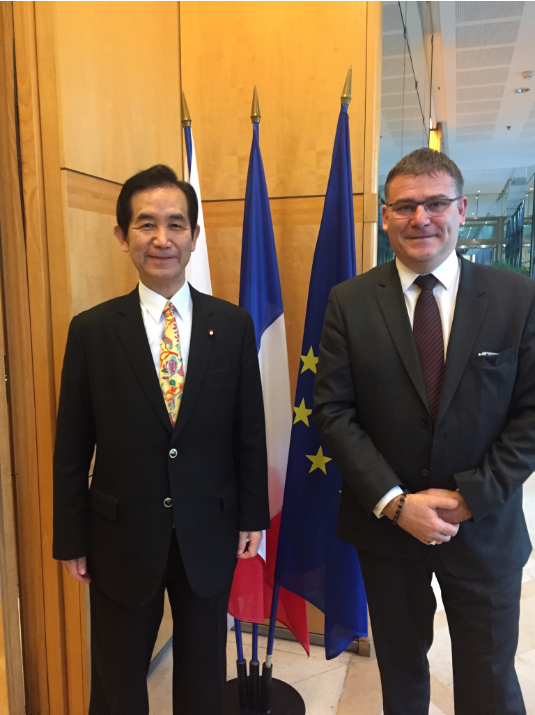
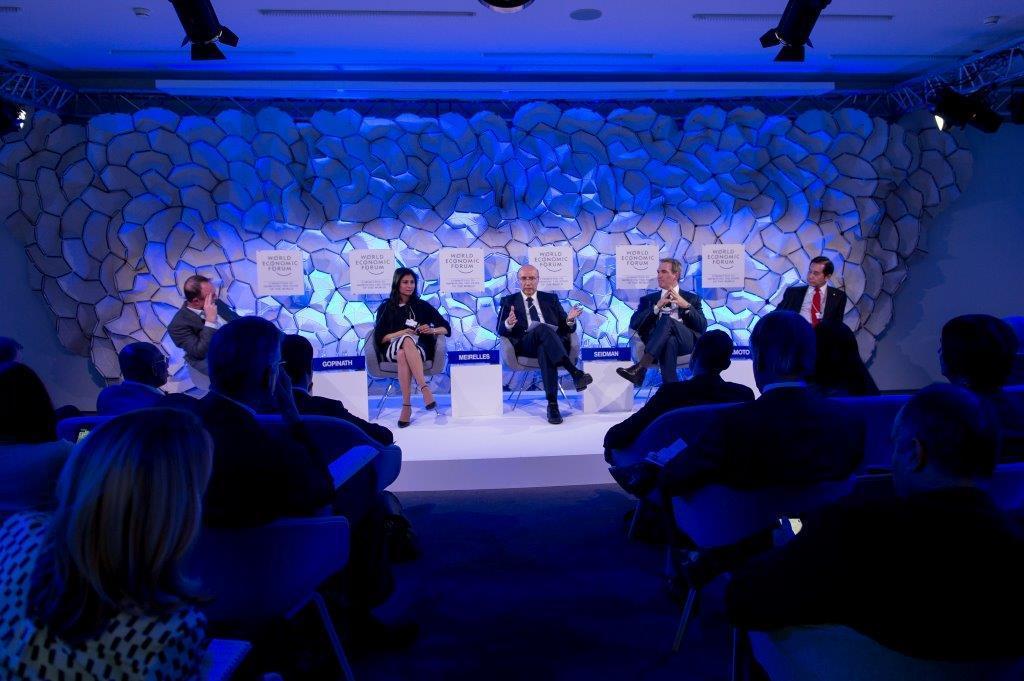
↑ In Switzerland, I had the honor of contributing to the World Economic Forum in Davos as the Japanese State Minister in charge of City, People, and Job-creation, and exchanged ideas with world renowned experts, offering my views on our country’s efforts, policies, and experiences. I mainly participated in two programs in Davos – Reexamining Modern Capitalism and China’s Growing Middle Class. Perhaps my most memorable moment was commenting on Western style business priorities of profits excessively serving shareholders’ financial interests in recent years, thus exacerbating income inequality and the decline of rural areas. Citing Max Weber’s “The Protestant Ethic and the Spirit of Capitalism,” I pointed out how capitalism lacking ethics can be problematic in the long run. I moved on to the Japanese model of corporations, which also caters to public interests, and must consider striving for not only short term shareholder profits, but also justly contributing to its employees, business partners, its local region, and global society in general. Without this kind of forethought, I expressed that income gaps will widen further and capital will never abundantly flow through regional municipalities. As a panelist, I mentioned how Toray Industries successfully developed carbon fiber through 40 years in the red; a rather inconceivable notion for a company like Du Pont. I finished my claim with the thought that business models that do not serve only short term stockholder interests, but rather mid and long term global needs, may be an essential aspect of capitalism necessary for moving forward.
Rustic Visits – The Kozo Travelogue for Regional Revitalization
November 6th
Mie Prefecture – Toba City, Ise City
Visited Mikimoto Pearl Island, where employees boasted their diving skills and taught pearl oyster cultivation techniques (Toba); witnessed the Kokuragiondaiko festival in Okageyokocho; offered prayers at Ise Shrine (Ise).
November 13th
Akita Prefecture – Senboku City
Test-rode the first autonomous bus of Japan on public roads around the shores of Lake Tazawa; visited an old samurai residence in Kakunodate transformed into a dry-ham curing factory in Senboku’s special economic zone.
November 19th, 20th
Hyogo Prefecture – Asago City, Yabu City, Toyooka City, Kami City, Shinonsen City
Learned about Hyogo Nakabayashi Co., a book-making company that also takes advantage of its downtime to restore abandoned farmland and grow garlic (Yabu), a new local business – “Toyooka Bags” – which utilizes the shopping district’s closed down stores (Toyooka), and a Kimoto style sake brewery that uses natural yeast and no mashing (Kami).
November 26th, 27th
Fukuoka Prefecture – Kitakyushu City
Witnessed caretaker robots in action and work drones that inspect public infrastructure; visited Kokura Castle, the former Yasukawa Family’s residence.
December 4th
Yamanashi Prefecture – Hokuto City, Minami-alps City, Nirasaki City
Observed formerly abandoned rice fields, recently cultivated by residences now living directly on the land; also partook in the agriculture (Minami-alps). Visited the house where Nobel Prize winner Dr. Satoshi Oomura was born, which is now utilized as a “rural life experience” hotspot (Nirasaki); finally, did hands-on winemaking in a land where the daylight hours are long and the grapes enjoy extreme temperature changes (Hokuto).
January 28th
Kumamoto Prefecture – Amakusa City
Studied “Ama-biZ,” which strives for “100 employments for 100 local businesses,” offers free consultation for entrepreneurs, assists with moving for new residents, and has thus far generated 180 new jobs.
January 28th, 29th
Kagoshima Prefecture – Nagashima City, Akune City, Satsumasendai City, Ichikikushikino City, Kagoshima City
Learned about the Sugimoto Brewery, where employees pursue artistic passions while simultaneously brewing Shochu; the Azumacho-gyokyo, which exports high quality farmed yellowtail to 29 countries (Nagashima); the Akune Station, which was remodeled to host open markets and interdisciplinary and industry events (Akune); and the Primaham Factory that succeeded in raising its output and sanitation levels, which created local jobs (Ichikikushikino).
February 11th, 12th
Hokkaido – Sapporo, Toubetsu City, Ebetsu City, Kitahiroshima City
Had a firsthand look to study what attracts 2.5 million visitors ever year to the Snow Festival (Sapporo); inspected a revamped brick factory which now serves as a commerce facility (Ebetsu), a remodeled school used today as an inclusive care-center, and other elderly care facilities (Kitahiroshima).
Tackling Revolving Door Issues of the Ministry of Education, Culture, Sports, Science, and Technology (MEXT) as Minister in Charge
I was mandated to perform a thorough investigation of all ministries and government offices by Prime Minister Abe to assuage both our and citizens’ concerns arising from dubious employments of ex MEXT officials. Within the Cabinet Bureau of Personnel Affairs, we have recently configured a Reemployment Surveillance Commission, which is comprised of members from the Cabinet Secretariat, outside specialists, and three lawyers, totaling to a force of 30 experts who will swiftly and effectively take action according to our findings in order to create an egalitarian playing field with no social losses for high rank reemployment.
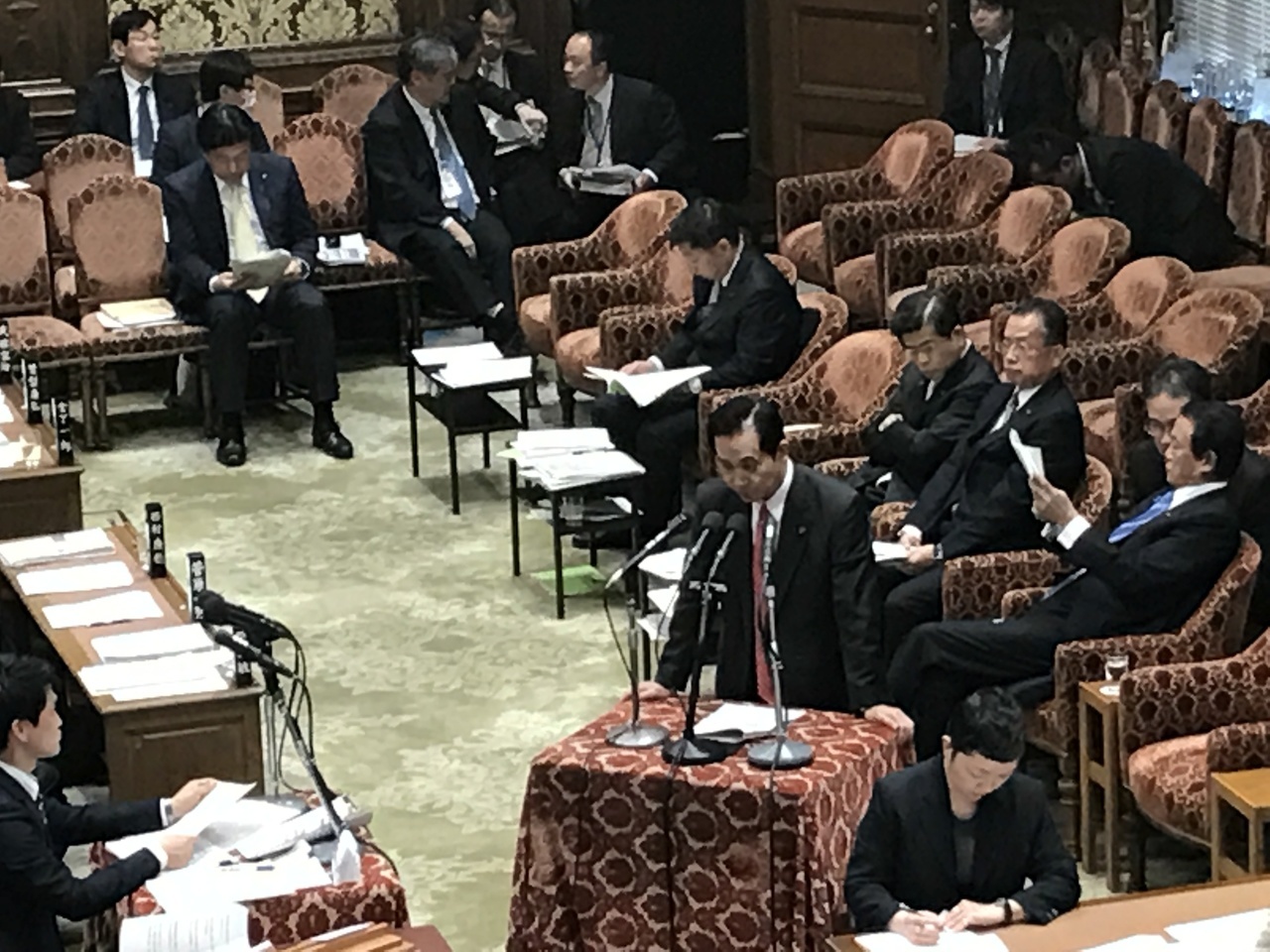
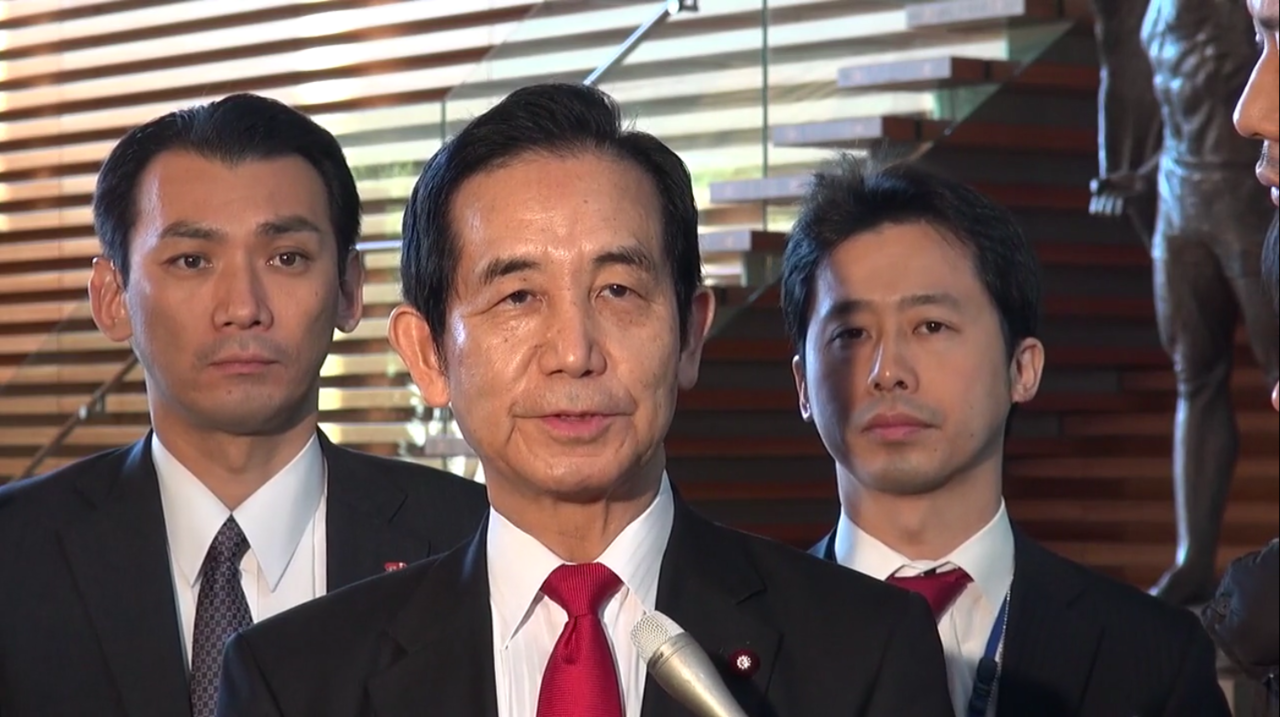
The Policy Change That All of Tokyo is Watching – The Formation of a New Advisory Council (on Youth Employment and Promoting Local Universities)
It’s an issue on which Tokyoites’ eyes are fixated. Excess migration to Tokyo has continued every year since 2012, with the metropolis taking in 120,000 more residents in 2015. Although the number somewhat lowered in 2016, the amount of students and youth seeking employment (ages 15~24) within these numbers has risen.
In November of last year, the National Governor’s Association took note of the situation and called for the curtailment of expansion of universities within Tokyo, controlling these universities’ intakes, and enhancing regional universities and/or ensuring employment for young adults in the countryside. We as the national government would like to go forward with policies in line with gubernatorial concerns; this involves an array of policies including 1) altering the tax system in favor of rural companies and industries, 2) relocating relevant government institutions to the countryside, 3) promoting the employment of professional and skilled workers in rural areas, 4) implementing student loan forgiveness programs for those who find employment in their hometowns, 5) making lifelong livable cities a reality, and 6) establishing various youth programs such as regional revitalization internships. Also, with accordance to the cabinet decision in December of last year, the 2016 version of the Act on Overcoming Population Decline and Vitalizing Local Economy in Japan, we will ensure that regional universities receive the tools necessary to rejuvenate their respective areas and ensure quality employment, which in turn will save universities within Tokyo from further burdens and help keep a balanced population within the country. In order to swiftly and effectively address these issues, I have formed an advisory council on youth employment and the promotion of regional universities, which had its first meeting on February 6th. We plan on holding hearings for various university affiliated organizations, local government bodies, and economic organizations, forming our priorities and releasing our interim report in mid-May.
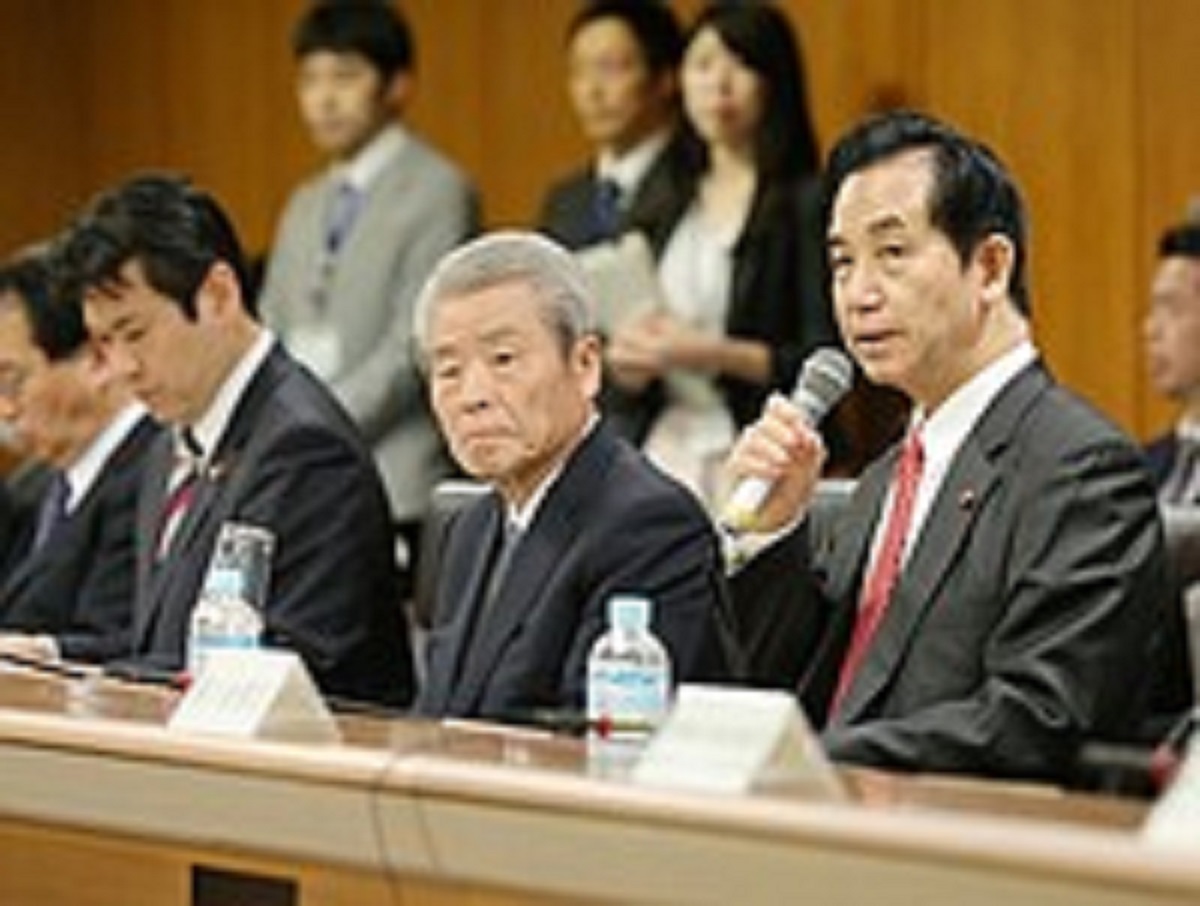
Seminars on Regional Revitalization – The Spirit of Self Help
As of January, the Cabinet Office and secretariat started holding seminars on regional revitalization for municipalities nationwide, starting in Fukuoka (1/10), Osaka (1/12), and Tokyo (1/13). In 2016, we visited 126 institutions in 54 cities, towns, and villages, establishing Evidence Based Policy-Making (EBPM) for 2017 derived from our studies of what strategies succeeded. Within this, along with the spirit of self-help, we wish to emphasize the support we offer in information, human resources, and finances that we laid out in the City, People, and Job Creation Comprehensive Plan. We would like to continue these efforts that bases action off of the information, data, and hard evidence that we have collected from the past.
Our most recent seminar (Tokyo, 1/13) as of February entailed a direct conversation with mayors of various municipalities in regard to FY2017’s national draft budget, modifications to the government’s comprehensive strategy, and how regional revitalization will be propelled further. Other topics in the seminar included the cabinet secretariat’s advice on how to effectively utilize the Regional Economy Society Analyzing System (RESAS), an overview of the City, People, and Job Creation Comprehensive Plan, and regional revitalization grants. We will also be hosting “Regional Revitalization Challenge Meetings” starting in February in Fukuoka, Miyagi, and Aichi Prefectures, where anybody with an interest is highly encouraged to participate (for further details, please visit the official City, People, and Job Creation secretariat website).
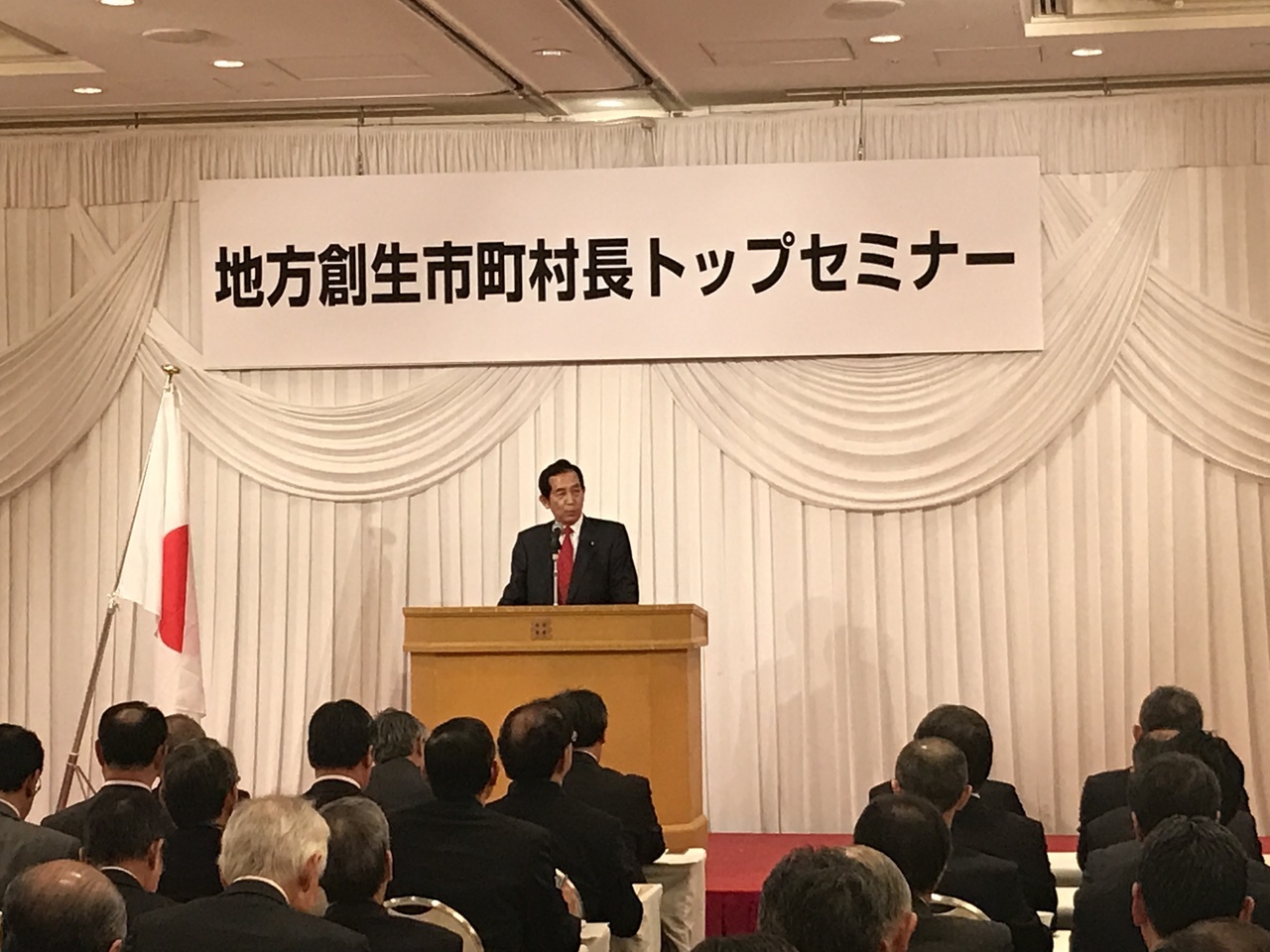
Reforming Economic Statistics as Minister in Charge of Administrative Reform
Coordinating and Adjusting the Government’s Economic Statistics
During a press conference in August of last year following my ministership appointments, I announced that I will coordinate and improve the government’s economic statistics as one of my duties as Minister of Administrative Reform. I’ve always had an interest in tackling problems with government statistics, and I’d like to engage these issues by implementing Evidence Based Policy-Making (EBPM), a system that utilizes statistics and other social science tools to base and evaluate public policy measures. The problem with this desire is that in Japan, each ministry and government office carries out and applies their own set of statistics with no coordination, adjustment, or cohesive criteria. On top of this, there exist issues with bias and lack of statisticians and tests, all of which lead to not being able to keep pace with modern trends such as e-commerce consumption data. Our current methods are struggling to match modern economic activity, which may have negative effects on investment and production. Academic, government, and political party circles have all wished to address these concerns, and if we do not act now, we may be stranded far behind internationally as well. With these fears and future opportunities in mind, I am determined to reform our government’s economic statistics.
Long before my Cabinet Office appointment, I have held numerous discussions and debates in private study groups on the various issues revolving around implementing EBPM. Continuing the discourse as Minister, as of October of last year, I started holding meetings for the Research Seminar on Economic Statistics and Various EBPM Needs with Professor Yoshiro Miwa as the chairman. Currently in its tenth round, experts debate and offer erudite advice on industrial structures, measurements of productivity in statistics, policymakers’ needs moving forward, mechanisms of economic statistics reform, how to establish an EBPM system, and other key issues.
Establishing the Council for the Promotion of Fundamental Reform of Economic Statistics
At the tail end of last year on December 21st, I was honored to have the Council on Economic and Fiscal Policy (chaired by PM Shinzo Abe) heed my humble advice and include within the Basic Policy for the Fundamental Reform of Economic Statistics, the creation of the Council for the Promotion of Fundamental Reform of Economic Statistics. The council will thoroughly deliberate and provide precise guidelines on: 1) how to prepare for the implementation of an EBPM system which appropriately utilizes sophisticated statistics; 2) reevaluating and expanding the criteria of how industries and goods are categorized in a manner that places production at the center of GDP statistics; 3) improving methods of economic statistics and the accuracy of GDP statistics; 4) reconstructing a user-friendly statistics system; and 5) how to tackle structural issues such as analyzing budget and personnel needs, the obtaining and training of personnel, and streamlining operations. Through these, we are confident in finding concrete reform measures that can create one unified statistics system in our country. So that the government can push for this in solidarity, we drew upon experts including the president of the Bank of Japan, university professors, and cabinet ministers such as myself, all led by Chief Cabinet Secretary Suga as the chairman. Although this is the first time a large scale cabinet meeting has been arranged for reforming statistics, we successfully held our first gathering on February 3rd. As we work towards raising trust levels in government statistics and laying out the framework of our policies by summer, I look forward to continuing my efforts with vested ministers and policy experts.
Economic Growth through Regulatory Reform and National Strategic Special Zones
By tapping into dormant demand, regulatory reform will be a pillar of economic growth, safely restructuring our economic system as one of the first key steps in reviving Japan. Starting in August with my ministerial appointment, I have placed Professor Hiroko Ota (from the National Graduate Institute for Policy Studies) as the chair of the Regulatory Reform Promotion Council, and sparked open debates in working groups with divisions including medical treatment and caregiving, investment, agriculture, and human resources. In order to fulfill the Implementation Plan for Regulatory Reform cabinet decision of June 2016 and implement further required reforms, I would like to give my all to these projects.
As for the national strategic special zones, we are well on the road to testing the six main pillars of regulatory reform by FY2018 during this designated “intensive period,” and studying which other areas could benefit from precise reforms in the twelve strategic regions.
In November of last year, I had the privilege of test-riding the first autonomous bus on a public road in Senboku City of Akita Prefecture. I proudly witnessed in Imabari City, Aichi Prefecture, private businesses taking on the construction of roadside stations, and for the first time in 52 years in Japan (and the first in Shikoku Province), the founding of a Department of Veterinary Medicine. I beheld a new business approval of land ownership in the special agricultural economic zone in Yabu City of Hyogo Prefecture. There are countless thrilling and innovative new saplings of hope that we must encourage and nurture in this country. As the first minister in charge of both regulatory reform and national strategic special zones, I hope to push these as two wheels of an axle to the best of my abilities. One will lead to investors from around the world noticing the new regulatory changes, praising Japan as an environment amiable to international business, while the other in synthesis corroborates the achievements of Abenomic policies around the country. If Japan, and especially the bountiful rural areas of our country, are to not only survive but prosper in this new era, it is imperative that we improve production and raise income levels in the countryside – I believe that our endeavors such as regulatory reform are crucial components of these undertakings. There may be opposition from entrenched factions, but I will rise to this challenge with everything I have.
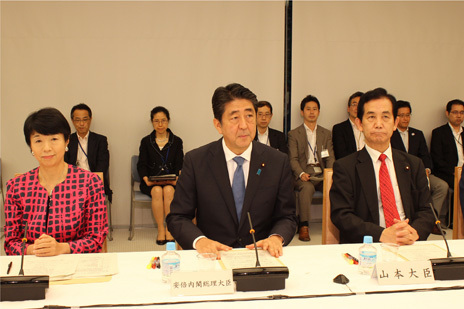
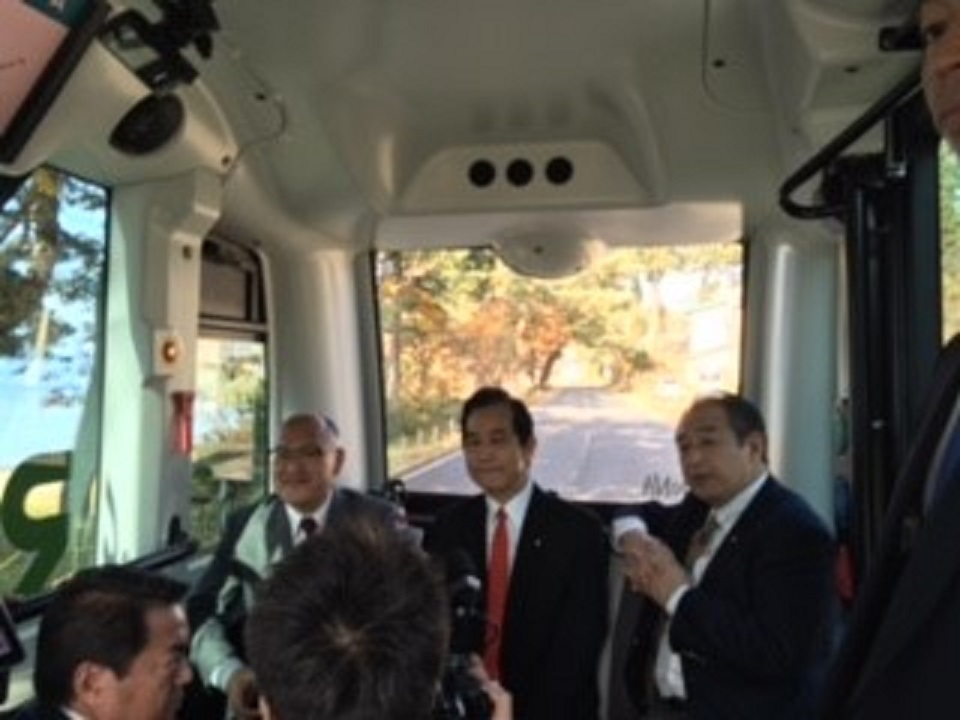
(中国語版)
众议院议员
山本幸三
活动报告录 2017年冬季版本
“去除私利,造福民众”的政治导向
去私利他
出任大臣的半年
地方创生工作折返 就任大臣 决定胜负的关键年!
新年快乐!
在此我想向大家表达我最衷心的祝愿,祝大家新年快乐,身体健康,万事如意。去年,安倍内阁第二次改选,我成功被任命为国务大臣,负责地方创生及规则制度改革等事务。从去年八月开始任职大臣以来,已经过去半年了。
今年1月20日,第193次通常国会会议成功召开。在接下来的150天内,国会内将展开激烈的辩论,该辩论会议将一直持续到6月18日。作为“最大的经济政策”,2017年的年度预算审议也在国会展开,我一直在推进该审批的进度,希望能够尽快通过。同时,我因为任职国会大臣的原因,不能时常回到老家福冈视察,但在对其中54个市町村的访问和对126处设施的调查中,我看到了很多创造性的提案并见证了那些为地方创生而努力工作的民众。
今年是《“街道,民众及工作创生”综合战略五年计划》的第三年,我们在努力地把纸上的政策变成现实,我也会努力履行自己的职责,也希望大家能够继续支持我的工作。祝愿大家在新的一年里一切顺利。
众议院议员
内阁府特命担当大臣
地方创生 街道,民众,工作创生
行政改革,国家公务员制度改革,规则制度改革 山本幸三
出访法国和瑞士
1月5日到9日期间,在短暂的新年假期后,我出访了法国和瑞士。在视察了法国国家图书馆巴黎馆和皮埃尔菲特馆后,我又和法国巴比松市的市长就地方观光产业创生以及景观维护政策等交换了意见。历史文物和文件被完善的保护在公文书馆内,包括在巴黎馆中保管者的632年的文物,以及在沉重铁门锁闭的金库中保存着的前法国总统戴高乐署名的法国宪法原本。
之后我又同法国财务经济部长西鲁格探讨了关于推动地方经济,电子经济以及环境改革,原子力,英国脱欧等议题,并交换了意见。在会谈中,我们还特别就“地方迁撤企业如何在一定财政支持下重回原来市场”等议题进行了讨论。双方收获颇多,并承诺在今后进行更紧密的联系与信息共享。
在瑞士,我有幸出席再达沃斯召开的世界经济论坛。作为日本政府地方创生大臣,我和世界各国的学者进行了交流,交换了意见,并谈论了日本在地方创生方面所做出的努力。论坛上我主要参与了两个议题的讨论。一个是“对现代资本主义的重新思考”,另一个是“中国等新兴大国的崛起”。在第一个议题的激烈讨论 中,我论述了关于“欧美公司盈利资本主义化”所产生的问题。通过引用马克思韦伯的“贸易保护论与资本主义精神”阐述了当今社会存在的资本主义伦理观的问题。在之后我还提及到日本公司的运营模式,在考虑公益并设立短期盈利目标的同时,还必须考虑对员工,商业伙伴,地方乃至整个社会的贡献。如果没有这样的考虑,我认为收入差会越变越大,资本会更难以流入到地方。在讨论中我还介绍了日本东丽公司如何成功地在四十年专注研发碳纤维,以及不得不提的杜邦公司。最后,我强调,那些不仅仅是注重短期利益且注重长期发展的公司的运营模式,才会是现代资本主义发展的风向标。
地方创生探访 – 山本幸三的视察录
11月6日
三重县 – 鸟羽市,伊势市
访问御木本珍珠,视察当地渔业作业和珍珠的养殖(鸟羽市);
视察托福小街内小仓祗园的太鼓表演,并参拜伊势神宫的正殿和荒祭宫。
11月13日
秋田县 – 仙北市
访问田泽湖畔并试乘日本首辆公路无人公交车;
拜访角馆的武士人家并参观经济特区农业法人化工厂。
11月19日-20日
兵库县 – 朝来市,养父市,丰冈市,香美町,新温泉町
兵库中林造书公司的废弃工厂活用为耕作地并种植大蒜(养父市);
活用改造商店街的空店铺为“丰冈鞄”的产地(丰冈市)。
酿造“生元酒”等使用天然酵母发酵的日本酒。
11月26日-27日
福冈县 – 北九州市
视察公共区域的设施情况,看护智能机器人的运作情况。
参访旧安川官邸和小仓城。
12月4日
山梨县 – 北杜市,南阿尔卑斯市,韭崎市
视察过去废弃的农耕地(现在被改造为地方农园);
参观诺贝尔奖获得者大村智博士的出生地(现为农家体验园)(韭崎市);
利用长时日照以及昼夜温差大等特点,栽培葡萄并生产红酒(北杜市)。
1月28日
熊本县 – 天草市
施行“Ama-biZ”政策,以“地方产业百家企业百人就业”为目标支持地方产业发展。现已创造出180个新的工作岗位。同时也推进当地住户的移居和定居。
1月28日-29日
鹿儿岛县 – 长岛町, 阿久根市, 萨摩川内市,市来串木野市, 鹿儿岛市
“杉本造酒”,工作人员在酿酒的同时还追求艺术的效果;
“东町渔港”,养殖高品质的黄鳍鱼并出口至29个国家(长岛町);
将阿久根车站改造为自由市场及工业产业活动举办地(阿久根);
普莱玛汉姆工厂成功提高了产量及卫生程度,并因此创造了更多的工作机会(市来串木野市)。
2月11日-12日
北海道 – 札幌市, 当别町,江别市,北广岛市
视察年访客量达250万人的札幌冰雪节(札幌市);
视察由炼瓦工厂改造的商业设施(江别市);
活用废弃学校占地为医疗中心并视察其他看护设施(北杜市)
作为地方创生大臣 解决日本文部科学省的旋转门问题
我被安倍首相任命调查全日本政府机关和办公室,从而回应市民门对前文部科学省官员的聘用事件的关心。在内阁人事部门下,我们成立了“再聘用调查委员会”。该委员会由内阁秘书处成员,外部专家以及3名律师等30名人员,根据我们所提供的线索进行公平的调查。同时也为防止同样的事件再度发生而加强管理。
东京瞩目下的政策改变 – 新咨询委员会成立 (青年就业及地方大学的推进)
2012年以来,向东京涌入的就业者数就在不断增加。连续四年,向东京流动的总人数在2015年达到了12万人,相较之下2016年的流入人数稍有所减少。虽然如此,入京求职的学生和青年(15到24岁)的人数却在增加。
去年11月,全国知事会要求东京都各高校停止扩招并缩减招生人数,同时推进地方高校的招生及青年的就业。作为国家政府,我们关注地方问题。从而衍生出的一系列政策包括1)调整税收政策从而支持地方企业和产业;2)将政府机构重分布建设在郊县区域;3)推进农村地区技术工人的就业;4)多发展就职农村大学生学生贷款免除项目;5)努力建造宜居城市及6)设立多种青年项目,如区域创生实习项目等。同时,根据去年12月的内阁决议 – 2016年克服人口减少问题并实现日本经济创生法案, 我们会支持地方大学的建造并保证就业,从而减少东京都内高校毕业生的就业压力,促进国内人口的区域平均分配。为了解决这些问题,我成立了新的咨询委员会,专注青年就业和地方大学的推进工作。该委员会的第一次会议将于2月6日召开。我们希望能听到更多来自大学组织,地方政府及经济机构的声音,并会在5月中旬发布我们的调查报告。
地方创生研讨会 – 自助创生的精神
年初1月,内阁办公室和秘书处开始定期召开面向全国的地方创生研讨会。研讨会首站设在福冈(1月10日),然后是大阪(1月12日)和东京(1月13日)。2016年,我们拜访了54个市町村的126个地方机构,建立了“基于成果的政策制定”机制,从而为2017年的后续工作提供支持。通过此方法,我们贯彻“自助”的精神,并推进“街道,民众和工作创生”的实施,强调在信息,人力以及财政方面提供的支持。基于过去的信息数据,我们将更加努力实现地方创生的计划。
2月间,我们与日本很多县市的市长就2017财政年的国家预算草案,政府综合战略及如推进地方创生何进行了意见交换。研讨会的其他议题还包括探讨内阁秘书处针对如何利用地方经济社会分析系统的建议,以及“城市,民众,地方创生”的大纲和“民众和工作创生计划”等。我们还会于2月在福冈,宫城和爱知县举办关于“地方创生所面临的挑战”的主题会议。我们欢迎所有对此议题感兴趣的人士参与我们的讨论(详细请关注我们的官方网站)。
大臣的行政改革事务 – 经济统计改革
协调政府的经济统计
去年8月,在我被任命为大臣后的记者发布会上,我宣布我将把政府的经济统计作为行政改革的一部分。我希望能够改革现在政府内的经济统计系统,并实施“基于成果的政策制定”机制。该机制利统计学及其他社科调查法分析并评估所实施的政策。其中的问题在于,日本的国家部委和政府办公室都有自己独立的经济统计方法,并无法协调或调整,也没有统一的标准。针对这一点,数据统计时很可能出现误差,同时也缺少一定的数据验真。我们现在的经济统计方法致力于满足现在经济活动模型,却可能企业投资和生产带来负面的影响。如果我们现在不想办法解决问题,那么我们将很快落后国际水平。因为有此顾虑,我决定改革政府的经济统计方法。
在我就任大臣之前,我的研究团队也进行了很多研究,探讨关于“基于成果的政策制定”机制的相关问题。在我就任后的去年10月,我和三轮芳朗教授一起召开了一些关于经济统计和“基于成果的政策制定”机制的研讨会。现在研讨会进行到了第十次,与会专家对产业结构,生产力的统计以及未来的政策制定进行了分析,同时还讨论了关于经济统计改革机制,如何建立“基于成果的政策制定”机制以及其他的相关问题。
建立经济统计基本改革推进委员会
年末的12月21日,我有幸在经济财政政策委员会(由安倍晋三首相主持)上发表了我的意见,这包括“经济统计改革的基本政策”和建立“经济统计基本改革推进委员会”的提议。新成立的委员会将贯彻以下指导方针1)如何使用复杂的统计学原理筹备实施“基于成果的政策制定”机制;2)重新评估并扩大产业和商品的定义范围并以产量作为GDP统计的中心;3)改善经济统计和方法并提高GDP统计的准确性;4)重新构建易使用的统计系统;5)如何解决结构问题,如预算分析和人力资源的需求,储备以及训练,还有业务精简等。通过这些政策,我们有信心在国内建立同意且坚实的经济统计系统。在政府的推进下,我们召集了来自日本银行专家,各高校教授以及内阁部长们(比如我自己),在内阁秘书处秘书菅义伟的号召下对相关问题进行讨论。我们成功的在2月3日召开了首次的内阁会议。该会议是历史上最大一次关于统计改革的内阁会议。我们希望能够提升政府统计的可信度并在今年夏天前建立我们的政策框架。在此我也很期待并将持续与各位大臣和专家一同为改革经济统计而努力。
制度改革的经济增长与国家战略特区
为了促进潜在的需要,制度改革将作为日本经济复苏的首要步伐,为经济增长和经济系统的重构提供支持。从去年8月出任大臣以来,我任命大田弘子教授(政策研究大学)作为政策改革推进委员会的主席,并在委员会中建立了数个研究小组,领域分支包含医疗,关护,投资,农业和人力资源。为了实现2016年6月内阁出台的“制度改革实施办法”等,我将重点在关注以上提及的项目领域。
关于国家战略特区,我们将在2018财政年测试制度改革后的六个主要区域,并研究如何从各试验区域吸取经验来推动其他十二个特区的改革和发展。
去年11月,我有幸前往秋田县田泽市并试乘了日本首辆公路无人公交车。我也很欣慰地在爱知县今治市看到,地方在建设新的车站并在52年内首次为大学兽医学科建设新研究大楼(也是在四国地区的第一次建立)。在兵库县的养父市,我还批准了特别农业经济区内的土地所有权。在这个国家内,我们有太多需要去解决的问题。作为第一位同时负责制度改革和国家战略经济特区的大臣,我会尽最大努力推进改革和发展。第一,我将努力打造新的经济制度,从而让吸引更多海外投资者,同时我也希望把安倍经济学的成果向全国推进。日本,不仅仅应该在当今世界站稳脚步,还应该变得更加繁荣。提高产量,提升郊县收入水平,这些政策将会让我们的制度改革变得更加成功,虽然在实施这些政策的道路上有很多坎坷,但我会尽我所能面度改革所带来的种种挑战,为日本经济复苏而努力。










